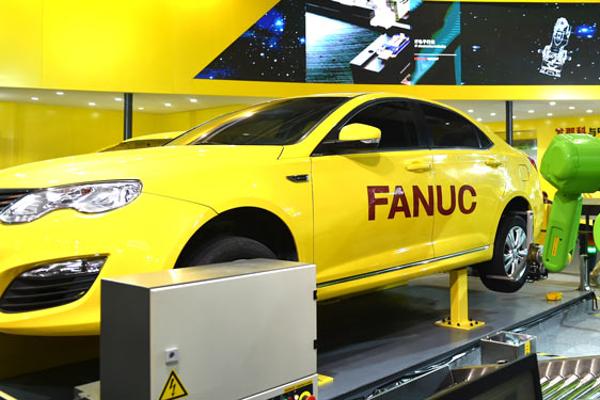
Japanese robot maker Fanuc Corp’s product at a fair in Shanghai.[Photo by Zhang Jinqiao / China Daily]
Overseas robotics companies are said to be scrambling to tap into the Chinese market, as surging labor costs prompt domestic manufacturing firms to seek new ways to cut assembly-line costs.
According to industry experts, Japanese and German companies in particular are looking to expand their investments in China, or find a new way in, wary of a possible surge in demand in the country.
One firm already well on the way to building its presence here is Japanese robot maker Fanuc Corp, which operates in China through joint venture partner Shanghai Fanuc Robot Co Ltd.
“We have been growing at an annual rate of 30 to 40 percent in recent years,” said Qian Hui, its general manager.
“China is on track to surpass Europe as our second-largest market.”
Last year, the firm sold around 10,000 robots in China with 45 percent of orders coming from the auto industry, but Qian said other sectors too are now raising their demand for robotics.
“Previously, our clients were predominantly automobile manufacturers, but more and more orders are now coming from industries like consumer electronics, and food and beverage,” said Qian.
To meet that growing demand, and to prepare for possible growing competition, the company has already set up a 60,000 square-meter factory in Shanghai, which went into production in December 2014.
“We currently have 600 employees in Shanghai, and over a third of them are involved in research and development,” Qian said.
Other companies with a presence in China say they have been stepping up their investments in recent months.
Germany’s Kuka Robotics Corp, the manufacturer of industrial robots and solutions for factory automation with 25 subsidiaries worldwide, has said it plans to up the ante in China, as has Yaskawa Electric Corporation, a Japanese manufacturer of motion controllers, AC motor drives, switches and industrial robots.
Kuka established its first overseas factory in Shanghai in 2014, where production capacity has now reached 5,000 units a year. Yaskawa also opened a robotics center in the city the same year.
But unlike most of their Chinese counterparts, which are still locked in low-margin competition, both the foreign robot makers say their focus is now firmly on the higher end of the market.
Shanghai Fanuc insists it only offers what Qian describes as its “best-performing robots” to Chinese enterprises, often using some of the world’s best technology.
Its most popular products sold domestically are industrial robot arms with load capacities from 5 to 200 kilograms.
“We are not satisfied with just meeting demand, we want to create demand in the same way that the iPhone changed consumer perception of what a smartphone can be,” he said.
A large part of Shanghai Fanuc’s effort has been in updating its clients on what the very latest robots can do. The company has also set up a training center to help nurture home-grown robot-related professionals for itself and its customers.
“Every year, we train about 2,000 workers for our clients, so they can make better use of robots.”
Despite all this growing demand from enterprises, however, Qian says the automation level still varies considerably from industry to industry, company to company.
“One minute you are in a local factory which is as highly-automated as the plants in the United States, the next you feel like you are in an African plant,” Qian said. “But this indicates just exactly where the opportunities are.”
